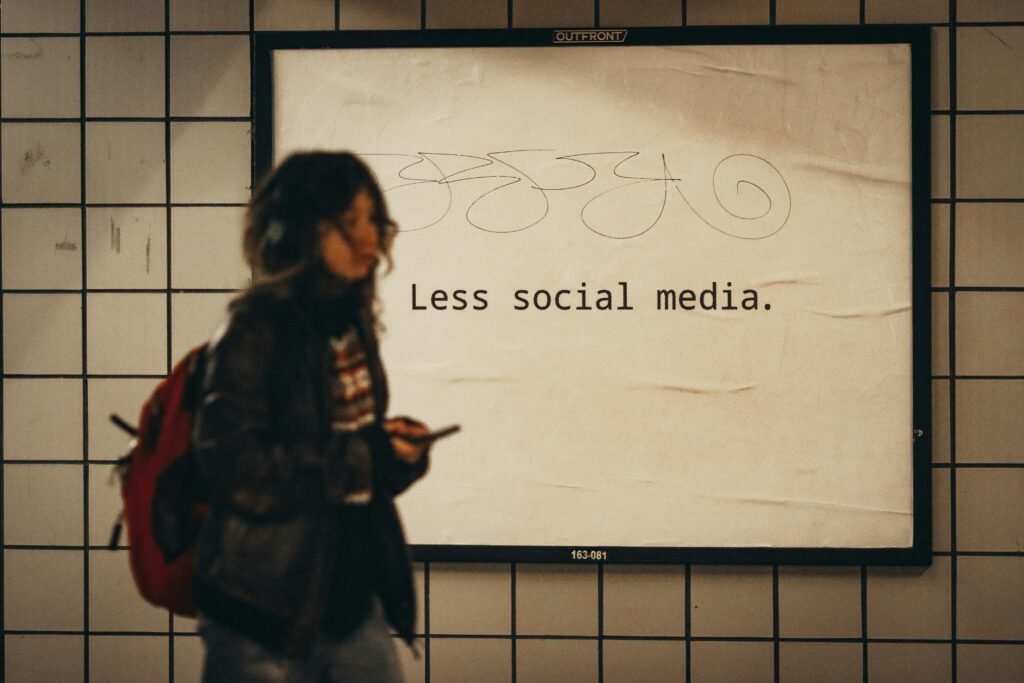
Social media connects, informs, and entertains—but too much of it drains attention, energy, and inner peace. Taking a conscious break, whether for hours, days, or weeks, can have surprisingly powerful effects on both body and mind.
Constant Stimulation: Why Social Media Exhausts Us
Every notification delivers a tiny hit of attention. In the moment it feels rewarding, but over time it scatters our focus. Three minutes turn into thirty, a “quick check” becomes a whole evening of scrolling. The result is mental noise, pressure to compare, and broken concentration. Our brains aren’t built for endless streams of stimulation—rest is not optional, it’s necessary.
Mental Health: Less Comparison, More Calm
Social media shows highlights, not reality. Constant comparison to curated images lowers self-esteem and distorts perspective. A detox interrupts that cycle. Many people report more calm, steadier moods, and a release from FOMO after just a few days. With distance, it becomes easier to reconnect with your own priorities.
Sleep and Recovery: Blue Light Out, Deep Sleep In
Late-night scrolling disrupts sleep. The light and mental input keep the brain alert when the body needs rest. Cutting social media one to two hours before bed improves both sleep quality and recovery, boosting energy, immunity, and mood the next day. Better sleep is one of the fastest returns on a detox.
Focus and Productivity: Regaining Deep Work
Multitasking is really just rapid task-switching, and every interruption costs time and clarity. By removing social media from your work window, focus sharpens. Tasks take less time, mistakes decrease, and flow states become more common. Less noise means more mental bandwidth.
Physical Health: Time for Real Needs
Less screen time creates room for movement, fresh air, cooking, and real connection. Even 30–60 minutes freed from scrolling can transform well-being: a walk, a quick workout, a home-cooked meal. A detox isn’t just subtraction—it’s an opening for better habits.
Relationships: Presence Over Posts
Online contact has value, but it rarely replaces face-to-face presence. Without the distraction of a screen, conversations deepen, eye contact comes naturally, and laughter flows more easily. Relationships thrive on attention, and a detox helps give that back.
Emotional Clarity: What Surfaces When the Noise Stops
Without constant input, your own thoughts and ideas begin to rise. Wishes, questions, and creativity often reappear in the space left by silence. Many people find more creativity and clarity during detox periods. Silence is not empty—it’s full of answers.
“All or Nothing?” Not Necessarily
Detox doesn’t have to mean forever. A full break can be refreshing, but often clear boundaries are enough. The real question is: Do you use social media—or does it use you?
How to Start a Social Media Detox
- Set a timeframe: try 14 days off social apps. Short, clear, measurable.
- Define limits if full detox isn’t realistic: two daily slots of 15–20 minutes, no use before 10 a.m. or after 8 p.m.
- Break the triggers: log out, move apps off the home screen, turn off all notifications.
- Replace, don’t just remove: prepare alternatives like reading, walking, journaling, calling a friend, or listening to music.
- Add friction: use blockers on your devices, enable focus modes.
- Track progress: note sleep quality, mood, focus, and screen time. Visible change keeps motivation high.
- Plan the return: decide which accounts and habits stay, and which go for good.
Everyday Experiments
- Morning window: spend your first 45 minutes of the day offline.
- Analog moments: read a book or write notes instead of scrolling during commutes.
- Social Sabbath: choose one day each week completely offline.
- Monthly cleanup: unfollow, mute, and unsubscribe regularly to curate your input like your diet.
From Consumer to Creator
When you scroll less, you free up energy for creation. Writing, drawing, cooking, building, music—energy once lost to consumption can be redirected into making. Detox is not just about less; it’s about upgrading the quality of how you spend your attention.
Balance, Not Extremes
Social media can be valuable: for community, visibility, and knowledge. The key is balance—knowing when it enriches you and when it drains you. A conscious yes to what helps, and a firm no to what harms, is more powerful than any absolute rule.
Conclusion: Health Needs Space
A social media detox is like opening a window in a stuffy room—suddenly the air feels lighter, fresher, clearer. It brings better sleep, calmer moods, sharper focus, and more vibrant relationships. Not everything changes overnight, but much improves sooner than you’d expect. The most important realization is this: you have more influence over your mental and physical health than endless scrolling suggests.
Call-to-Action:
Start today. Turn off notifications, set two short windows for checking apps, and try a “Social Sabbath” this weekend. Track your mood, sleep, and screen time for two weeks—then decide, with clarity, how much social media truly deserves a place in your life.
